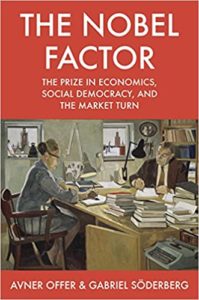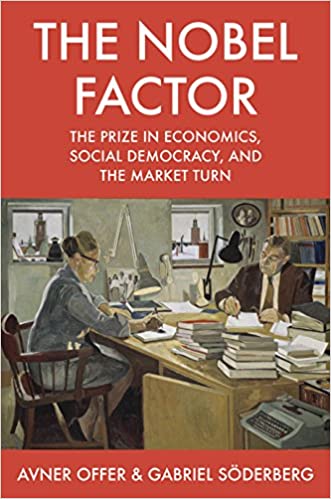
The Nobel Factor,1 a 2016 book by Avner Offer and Gabriel Söderberg, looked to be right up my alley. Offer, an emeritus professor of economic history at the University of Oxford, and Söderberg, a researcher in economic history at Uppsala University in Sweden, do a broad overview of most of the winners and briefly lay out their contributions. They also criticize many of the Nobel Prize winners, sometimes with ad hominem arguments. They have two major themes. Their first is that the Nobel Prize was initiated in the late 1960s as a way to raise the public’s respect for economics as a science. The second is that economics fails at being empirical and the pro-free-market views of many of the winners reflect an ideological commitment more than a scientific understanding. They succeed at the first and fail at the second.
Even though I think they fail at the second, and I’ll say why shortly, the book is chock full of interesting facts. Here’s one nugget: In 1968, economist Milton Friedman, a major player in the Mont Pelerin Society [MPS], nominated philosopher John Rawls for membership in MPS. Rawls became a member and withdrew three years later.
This is from David R. Henderson, “The Nobel Factor: What Does the Prize Reward?” Econlib.org, April 5, 2021. It’s my review of The Nobel Factor: The Prize in Economics, Social Democracy, and the Market Turn, by Avner Offer and Gabriel Söderberg.
My review is mainly critical, but I end on a high note:
Being a glass-half-full person, I’ll end on two positive notes that show that maybe the authors are not so closed as they sometimes seem to economic freedom. They note that Robert Fogel, co-winner of the 1993 price, wrote that slavery “was economically as efficient as free farming.” They then spot the error, writing, “What he meant to say was that it was as profitable, which is not the same thing. This finding was hardly consistent with the economic conception of efficiency, which stressed free choice, or with its focus on individual welfare, such individuals presumably including slaves.” Bravo!
The second glimmer of hope is in their recognition of the difference between voluntary and coercive funding. In discussing how the funding for the economics Nobel differs from the funding of the other five, the authors write, “Alfred Nobel’s motivation was sublime, and the money came out of his will; the chain of causes for the economics prize was something of a farce, and was paid for by Swedish taxpayers.” I couldn’t have said it better.
Read the whole thing.


READER COMMENTS
Daniel Kuehn
Apr 7 2021 at 10:06am
Work in the Hoover archives by Quinn Slobodian and Leif Wenar suggests the Rawls membership thing is probably an overstatement: https://twitter.com/LeifWenar/status/1329545538883133440
https://twitter.com/zeithistoriker/status/1260299877537337344
He did not withdraw, he was removed for non-payment of dues. The dues may not have paid because he may not have even been aware he was ever put on the membership list. There’s no correspondence between Rawls and MPS and he is missing from memberships in these years. Wenar guesses (and I think it’s plausible), Friedman put him on but Rawls never knew or engaged and then it lapsed.
Comments are closed.